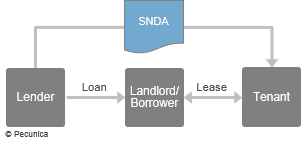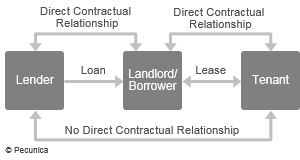A subordination, non-disturbance and attornment agreement (SNDA agreement) is employed by a landlord, tenant and the lender to resolve how and when the rights of tenants will be subordinate or senior to the rights of lenders. Mortgage lenders frequently require major tenants to sign an SNDA agreement to assure that the lender’s mortgage is superior to the tenant’s lease and that cash flow from the property will not cease. The SNDA agreement also assures tenants that, even if the landlord defaults on its loan and the lender forecloses on the property, the rights of the tenants to their leased premises will be preserved (“non-disturbed”) on defined conditions within their control.
| An SNDA Agreement |
 Source:
|
The SNDA also generally assures a lender that the tenants will confirm privity of contract to the lender – as in a credit tenant lease – or a purchaser of the real estate by agreeing to (“attorn to”) continue as tenant of the new landlord following a foreclosure on the property and, often, that the lender or such purchaser will have certain specified rights thereafter. Attornment is the acknowledgment of a new landlord and a tenant’s expressed or implied consent to the transfer of rights from the previous landlord such that the tenant continues to be a tenant of the new landlord and occupy the property after its sale without the creation of any new rights for the owner.
Privity of contract creates rights and obligations for the contractual parties that entitle them to exercise legal remedy in the event that any party fails to perform under the contract. The SNDA agreement prevents the use of assignment to circumvent the privity doctrine by preventing the person who bears the obligation of a lease from becoming liable to a person with whom the contractual relationship did not exist.
| Privity of Contract |
 Source:
|


Leave A Comment
You must be logged in to post a comment.